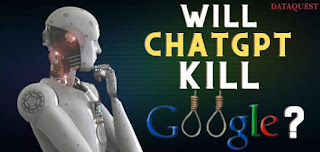How ChatGPT is Killing GOOGLE and Amazon
As artificial intelligence continues to rapidly develop, one technology is starting to stand out as a potential disruptor for the likes of Google and Amazon: chatbots based on the GPT-3.5 architecture, such as ChatGPT.
At their core, these chatbots are designed to understand natural language and respond accordingly, making them ideal for tasks such as customer support, product recommendations, and more. But what sets them apart from previous generations of chatbots is their ability to learn and adapt based on their interactions with users, allowing them to continually improve over time.
This means that as more people interact with chatbots like ChatGPT, the more data they can collect, and the more accurate and effective they become. In other words, they have the potential to create a virtuous cycle of learning that could eventually make them a dominant force in the world of online search and e-commerce.
Consider the example of Google. For years, the company has been the undisputed king of online search, thanks in large part to its ability to understand and respond to user queries. But as chatbots become more sophisticated, they could start to eat away at Google's dominance by providing more personalized, conversational search experiences.
Instead of typing in a query and receiving a list of links, users could simply ask a chatbot like ChatGPT a question and receive a natural-language response. And because these chatbots can learn and adapt based on their interactions with users, they could quickly become better at understanding and responding to queries than even the most sophisticated search engines.
But the potential disruption doesn't stop there. Amazon, too, could find itself under threat from chatbots like ChatGPT. Currently, Amazon relies heavily on its recommendation engine to drive sales, but this system is largely based on analyzing user behavior and purchase history. Chatbots, on the other hand, have the potential to provide much more personalized and human-like recommendations by taking into account a wider range of factors, including user preferences, context, and even emotional state.
In fact, some experts predict that chatbots could eventually replace many of the functions currently performed by human customer support agents. With their ability to understand and respond to natural language, chatbots can provide faster and more accurate responses than human agents, while also freeing up valuable resources for companies.
Of course, there are still many challenges that need to be overcome before chatbots can truly challenge the dominance of companies like Google and Amazon. One of the biggest is ensuring that these chatbots are able to understand and respond to a wide range of queries and contexts, without becoming confused or providing inaccurate responses.
But with the rapid development of AI technology, and the increasing sophistication of chatbots like ChatGPT, it's clear that these challenges can be overcome. And when they are, the potential disruption to the world of online search and e-commerce could be profound.
In conclusion, chatbots based on the GPT-3.5 architecture, such as ChatGPT, have the potential to disrupt the dominance of companies like Google and Amazon by providing more personalized and human-like search and e-commerce experiences. While there are still challenges that need to be overcome, the rapid development of AI technology suggests that these chatbots could eventually become a dominant force in the online world.


Comments
Post a Comment